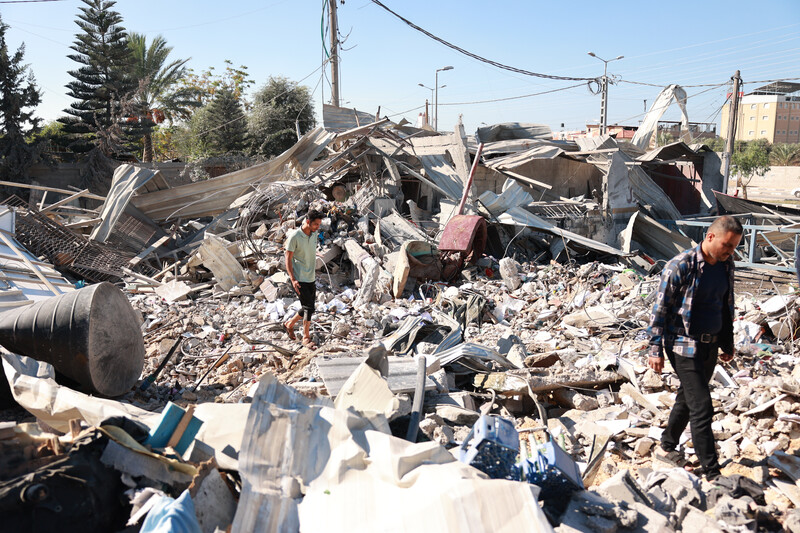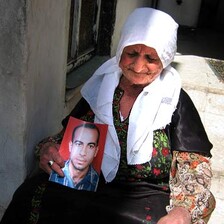15 December 2023

Israel’s targeting of Nuseirat refugee camp on 15 November caused huge damage.
APA imagesIt was the 37th morning of the Israeli aggression on Gaza, when Hana, 39, woke up and started acting in an unusual manner.
“She prayed al-fajr [dawn prayers], started cleaning dishes and organizing our home. My aunts, their daughters, my brothers and I stared at her. None of us said a thing,” her son Aboud, 19, later said.
Her apartment, located in the central part of Gaza Strip, was filled with people who had been forced to move from the north to escape the Israeli bombardment. The Israeli army had ordered people to leave for the central and southern “safe zones.”
Like everyone else in Gaza, they had no running water. Israel cut off the water supply to the territory early in its attack. They instead went looking for water every day to carry it back in canisters and bottles.
Usually that task fell to Hana’s three sons, Aboud, Amr, 18, and Islam, 15. But this morning, as they carried water to their apartment on the fifth floor, their mother decided – for the first time – to help them.
“What is happening, mom? What are you doing?” Aboud stopped to ask.
“Nothing, darling. I just want all the displaced in my home to feel like they’re in their own homes,” she answered.
Saying nothing, Aboud walked up the stairs lost in thought. Hana was a very kind woman. She was also the last one her children had in this world.
The first loss
They lost their father, Shadi Alsbakhi, in 2008 when the Israeli army without warning bombed all the police stations across the Gaza Strip, signaling the start of Israel’s 2008-9 aggression that would eventually kill more than 900 civilians along with over 250 civilian police officers in those first moments of the assault.
Aboud was 4. Amr was 3 and Islam only 3 months old.
Hana decided not to marry again and to live for her kids. She was their mother, their father, their sister, their friend and their teacher.
Shadi’s brother, Majdi Alsbakhi, swore to help raise his nephews for his martyred brother. And he did. He raised them alongside his own children.
But on the 17th day of the current aggression, he too was murdered by the Israeli military. The boys felt they had lost their father again. But they had little time to grieve.
Just four days after Majdi’s death, they also lost their maternal uncle, Muhammad Alsbakhi.
Muhammad and his son Ibrahim had gone to the Abu Dalal shopping mall to find food when Israel shelled the mall.
Both were killed, alongside eight others.
“We couldn’t even get over uncle Majdi’s death, how are we supposed to deal with another one,” Aboud said.
Missile strike
Life isn’t fair. But at least they still had Hana.
Right?
“Come here all, come here Aboud!”
Hana had gathered everyone in the house, including all those who had sought shelter in their home.
“You don’t have to be scared,” she told them. “I’m a mother of three orphans. You’ll never get hurt in my home.”
Then the walls suddenly caved in and they could see nothing but dust.
Aboud slowly came around but could barely stand. He started looking for his mother and brothers. He saw neighbors carrying Islam, who had been injured in his shoulder. Aboud was injured too but he didn’t feel anything and continued to look for his mom.
They told him that maybe Hana had run downstairs when the missile had struck. But he didn’t believe them.
“Mom would never leave without us, without making sure we were fine.”
He finally found her. She was on the floor; an angelic smile on her face. Time stopped.
“I’ve lived without my dad for 15 years, will I have to live without my mom now, too?” Aboud thought to himself, he later told The Electronic Intifada.
He carried her down the stairs. The ambulance took both of them.
When they arrived at the hospital, Hana was declared dead. Aboud cried but had no one to turn to for comfort. The rest of his family were injured and receiving treatment.
A goodbye kiss
Islam had been taken to another hospital. Aboud left his mom and went to see his youngest brother.
But he couldn’t bring himself to tell him what had happened to their mother.
“Where’s mom, Aboud?” Islam asked.
“She’s injured and she can’t come to see you,” Aboud had replied.
Islam knew he was lying but Aboud insisted.
Of course, he couldn’t continue the lie. When they went to bury Hana, Aboud knew he would regret not letting Islam give their mom a goodbye kiss.
“Mom was killed, Islam,” he told his younger brother. Then he swore, through his tears, that he would always look after him. “Don’t worry, brother, I’m here with you. I have your back.”
Together, Aboud and Amr carried Islam to say a last goodbye to their mother. They kissed her and left her to meet their dad.
“Rest in peace mom,” they told her. “Tell our dad that we miss him.”
Then they left, now bereft of family and home.
Hana Hassan Alsbakhi was killed in her home in the Salhi residential tower in the Nuseirat refugee camp after Israeli airstrikes targeted the building on 15 November.
Two others were killed in the strike.
Hadeel Sbakhi is a writer from Gaza.


